Pakistan incurs average annual losses exceeding $2 billion due to climate-related disasters, significantly worsening the country’s already high poverty levels, according to the Asian Development Bank (ADB). In its Annual Report 2024, the ADB highlighted Pakistan’s vulnerability to climate events, noting that women and other vulnerable groups suffer disproportionately from these impacts.
To address these challenges, the ADB signed a $500 million policy-based loan with Pakistan in 2024. The program aims to enhance the country’s capacity for disaster planning, preparedness, and response. The financing will support disaster risk mapping and modelling, mobilizing public and private funds for climate resilience, and improving coordination for disaster monitoring and response.
Additionally, the ADB will use its contingent disaster financing facility for the first time in Central and West Asia, enabling rapid financial disbursements in the event of a disaster.
The report also pointed out that despite Pakistan’s ongoing economic performance, the region faces significant development challenges, with persistent poverty and limited access to essential services, particularly in countries like Afghanistan, the Kyrgyz Republic, and Pakistan.
In further support, the ADB committed an additional $330 million to expand a grassroots social protection program in Pakistan, aimed at benefiting 9.3 million people, especially poor women and their families.
This initiative will improve targeting for poverty assistance, provide conditional cash transfers to support children’s education, and increase access to healthcare and nutrition services for women, teenage girls, and children in disaster-prone areas.
The report also addressed the growing urban population in Pakistan, noting a decline in living standards due to inadequate public services, poor urban planning, and the effects of climate change.
To address these issues, the ADB published a report outlining a new urbanization model for Pakistan, focusing on strengthening urban planning, promoting public-private partnerships for urban services, and ensuring gender-responsive budgeting.
Additionally, the ADB announced a $41.2 million non-sovereign loan for SAFCO Venture Holdings Ltd to develop a facility in Sheikhupura. This facility will produce 200,000 tonnes of sustainable aviation fuel, cutting carbon emissions by up to 85%. The project is expected to export all its output, primarily to the European Union, generating valuable foreign exchange for Pakistan.
The ADB’s total loan portfolio for Pakistan now stands at $16 billion, with an additional $4.59 billion in undisbursed effective loans, bringing the total to approximately $20.8 billion, or 10% of Pakistan’s total loans.
The ADB continues to increase its financial support for development challenges in Asia and the Pacific. In 2024, the bank committed $24.3 billion in financing and $14.9 billion in co-financing with partners to address issues such as affordable energy, transport, and strengthening education, healthcare, and social protection systems.




